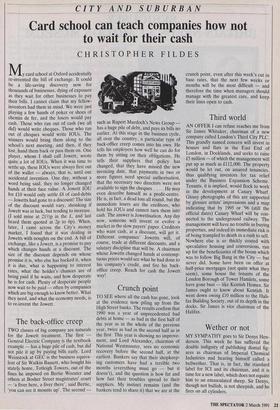CITY AND SUBURBAN
Card school can teach companies how not to wait for their cash
CHRISTOPHER FILDES
My card school at Oxford accidentally re-invented the bill of exchange. It could be a life-saving discovery now for thousands of businesses, dying of exposure as they wait for other businesses to pay their bills. I cannot claim that my fellow- inventors had them in mind. We were just playing a few hands of poker or shoes of chemin de fer, and the losers would pay cash. Those who ran out of cash (we all did) would write cheques. Those who ran out of cheques would write IOUs. The winners would bring them along to the school's next meeting, and then, if they lost, hand them back or pass them on. One player, whom I shall call Jowett, wrote quite a lot of IOUs. When it was time to settle up, these IOUs were always first out of the wallet — always, that is, until our accidental invention. One day, without a word being said, they no longer changed hands at their face value. A Jowett IOU for £10 would only settle £8 of card-debts — Jowetts had gone to a discount! The size of the discount would vary, shrinking if Jowett was in luck, but tending to increase. (I sold mine at 21V2p in the £, and last heard them quoted at 2p to 6p). When, later, I came across the City's money market, I found that it was dealing in Jowetts with noughts on the end. A bill of exchange, like a Jowett, is a promise to pay which changes hands at a discount. The size of the discount depends on whose promise it is, who else has backed it, when it is due, what is happening to interest rates, what the holder's chances are of being paid if he waits, and how desperate he is for cash. Plenty of desperate people now wait to be paid — often by companies which are big enough to know better. What they need, and what the economy needs, is to re-invent the Jowett.


















































 Previous page
Previous page